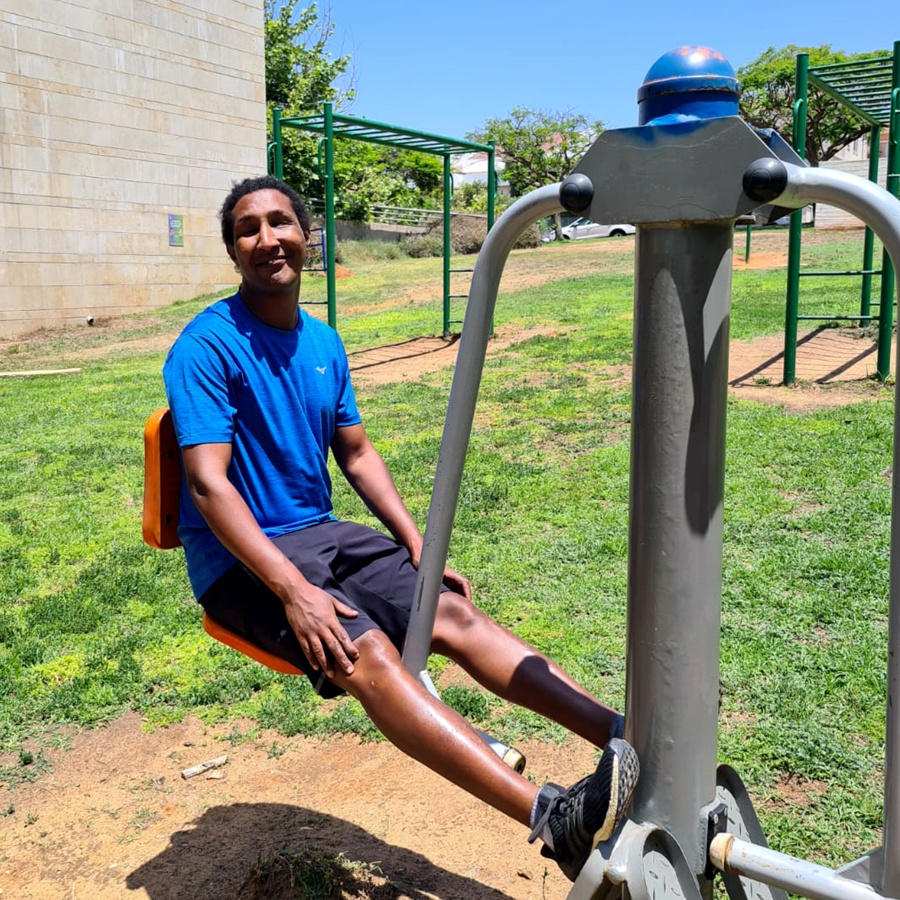
26 May From Ethiopia to Israel to the Paralympics
- Copy Link
From Ethiopia to Israel to the Paralympics
As a child, Beza made Aliyah from Ethiopia through Operation Solomon in 1991. Despite being blind, he went on to compete in marathons and the Paralympics as an Israeli athlete.
Born blind, Beza grew up in a village in Gondar with his mother and older brother. His father abandoned them when Beza was an infant, not wanting the responsibility of raising a son with a disability. At age seven, Beza was told his family was going to move to a new country.
“I was just a kid, so that didn’t really mean anything to me. I just thought that we were going on a trip,” recalled Beza. “I do remember that my mother was watching me more carefully than usual. Other than that I don’t remember anything special about us leaving Ethiopia.”
But the circumstances under which Beza’s family left Ethiopia were quite special indeed. Beza, his mother and brother, as well as his mother’s family, including aunts and uncles and cousins, all made Aliyah together through Operation Solomon. Operation Solomon is the largest Ethiopian Aliyah operation to date, covertly airlifting 14,325 Ethiopian Jews to Israel in just 36 hours from May 24 to May 25, 1991. Upon arrival in Israel, Beza and all of his family members stayed at a Jewish Agency Absorption Center in Tzfat.
“My first real memories in Israel are of the food. It tasted very different, and for the first time I was given silverware and expected to use it,” remembered Beza. “But it felt nice to live in a modern building and not a hut made of wood or clay.”
“I also spent a lot of time in the hospital in Israel because they were trying to figure out what was wrong with my sight,” added Beza.
Settling into Israeli society, moving to another culture and learning a new language was very difficult, shared Beza. Nevertheless, the family did their best to acclimate and Beza credits The Jewish Agency with helping their transition.
“The Jewish Agency is amazing. They didn’t just bring us on Aliyah; they helped us integrate into Israeli society, which is hard to do and very important,” Beza said. “I see now, with the newer immigrants, how much effort The Jewish Agency puts into helping them so they will have good lives in Israel. I’m very happy to see the wonderful things they do.”
After the Absorption Center, Beza and his family moved to Netanya, and at age 10, he went to a boarding school for the visually impaired in Jerusalem. For the first time, he understood that he was different — but he decided his blindness was not going to limit him. And it didn’t.
Beza had always played sports but at age 18, he was introduced to the world of serious athletics. He started in tandem biking before moving on to running, doing so with someone else at his side, the two tethered together at the wrist.
“When I run, I feel a sense of competence. A sense of fun. Air. Victory,” shared Beza. “Doing well in sports helped me dream of other things I wanted to accomplish.”
In 2007, Beza ran in the Rotterdam marathon and the Amsterdam marathon. He competed in the 2008 Beijing Paralympics, coming in fifth among the totally blind runners. A few weeks after the Paralympics, Beza and two Israelis went to Nepal together and climbed the 5,545-foot summit of Kala Patthar, which offers a close-up view of Mount Everest. Despite not being able to see the mountain, Beza felt an incredible sense of accomplishment after the challenging trek.
For his next adventure, Beza chose something closer to home: teaching. In 2017, he got his teaching degree and he now teaches physical education to high school students in Raanana.
“My dream now isn’t as much about athletic achievement. I want to teach my students to be tolerant and show each other respect,” said Beza. “I want a world with peace and love. And I want to help other people reach their own dreams. I’m very happy I went into teaching. I feel that I’m giving to society. And teaching gives to me, too.”
